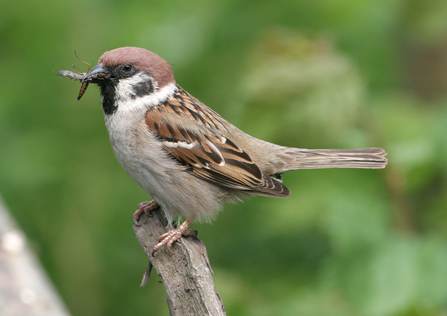
Tree sparrow, once a common sight in the region, but now in decline. Image by Mike Snelle.

Tree sparrow, once a common sight in the region, but now in decline. Image by Mike Snelle.
The most important global summit for nature in decades - the UN Convention on Biological Diversity, also known as COP15 - starts in Canada on 7 December and runs until 19 December. What happens there will directly affect wildlife in this region.
The conference comes at a time when the latest study suggests the Earth’s wildlife has plummeted by almost 70% in the last 50 years. The state of nature in the region is not much better and recent Government actions threaten to make a bad situation even worse. This will mean red faces on the world stage at COP15 and diminish the UK’s power to negotiate.
The UK is one of the most nature-depleted countries in the world - and in Northumberland, Newcastle and North Tyneside wildlife has suffered over recent decades from river pollution and the decline of birds and mammals such as otters, tree sparrows and swifts to large-scale housing developments.
Unfortunately, the Government’s Retained EU Law Bill threatens to remove vital wildlife protections and the targets they propose to set for nature’s recovery are not ambitious enough.
Mike Pratt, Northumberland Wildlife Trust Chief Executive says:
“Bold action is needed to tackle the twin nature and climate crises at COP15. The next eight years need be ones of dramatic improvement for nature in order to fulfil the proposal to protect 30% of land and sea by 2030 - something that the UK has already promised to do.
“In Northumberland, Newcastle and North Tyneside we are working hard to restore nature - to help wildlife recover and to help us mitigate and adapt to a changing climate. However, recent Government decisions - as well as lack of action in other areas - undermine nature’s ability to recover. We need to see the Government set out far more ambitious targets for nature if it’s to keep its commitment to pass the environment on in a better state to the next generation.
“Shockingly, the Government’s current plans will mean even less wildlife in 20 years’ time than we have now. We’re asking our MPs to ensure a truly ‘world leading’ target that aims to leave the next generation with more nature - not less.”
Northumberland Wildlife Trust wants to see the UK Government take the following action:
The Government is due to publish their Environment Act targets - but current proposals will mean even less wildlife in 20 years’ time than there is now. We want to see a target to increase species abundance by at least 20% by 2042, compared to 2022 levels.
The Wildlife Trusts declared an ambition to help the UK reach the 30 by 30 goal two years ago and have since begun a number of new projects to help nature recover.
Further information: Northumberland Wildlife Trusts wants to see the Government take the following actions: